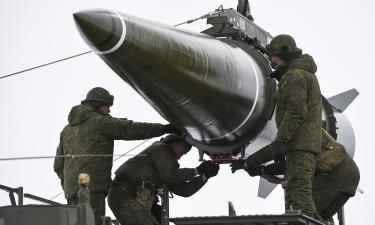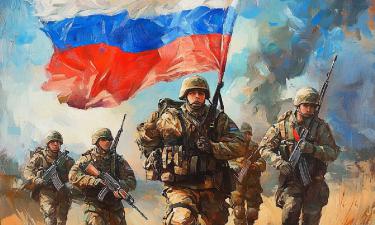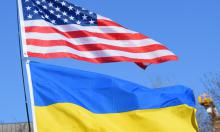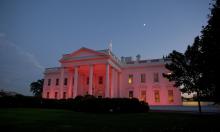Russian intelligence honors most important Soviet-era spy
Russian intelligence on Monday paid honor to one of Moscow's most important Soviet-era spies.
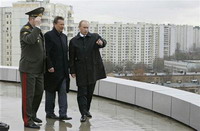
The accolade for British double agent George Blake, and the award of the nation's highest medal to another prominent Soviet spy, came five months after Queen Elizabeth II honored Oleg Gordievsky, a high-level KGB man who defected to Britain in 1985.
It's not known whether the Russian honors are a riposte to Britain, but they come as Russia is expanding its spying to Cold War levels or higher, according to U.S. and British officials.
Britain's ties with Russia have been badly strained over the case of Alexander Litvinenko, a former KGB officer fatally poisoned last year in London by a radioactive isotope. Russia has refused to hand over Britain's sole suspect, another ex-KGB man.
President Vladimir Putin, himself a KGB veteran, speaks proudly of his record, and the tributes to Blake and George Koval appear aimed at boosting patriotism as Russia heads into parliamentary elections Dec. 2.
On Monday, Blake was praised by the Foreign Intelligence Service, a KGB successor agency, in comments carried by Russian media, and by the service's spokesman.
Blake delivered a double humiliation to Britain at the height of the Cold War, first by reportedly betraying dozens - hundreds, some say - of Western agents while working for MI6, Britain's equivalent of the CIA, and then by staging a daring escape in 1966 from his London prison.
Blake still believes he did the right thing.
"I could have left the service, and I could have joined the Communist Party, and I could have sold the Daily Worker (communist newspaper) at a street corner, and many people would say that would have been a more honorable cause," Blake told Russia Today, an English-language cable TV network, in an interview broadcast Sunday, his 85th birthday.
"But I felt that I could do more for the cause, make a far greater contribution, if I set aside my scruples."
His greatest coup was to tip off the Soviets in the 1950s to a tunnel the British and Americans had dug into communist East Berlin to tap into Soviet military communications. The Soviets used it to feed phony information to the West for nearly a year.
"The information provided by Blake was always acute, precise and extremely important," Sergei Ivanov, the Foreign Intelligence Service spokesman, told The Associated Press. He refused to say how many Western spies Blake exposed.
Unmasked in 1961, Blake was sentenced to 42 years in prison, but five years later, aided by sympathizers, he escaped and fled to the Soviet Union. He was made a KGB colonel, wrote two memoirs and still trains Russian spies.
Blake told Russia Today he chose to switch allegiance during the Korean War, when, as a British vice consul in Seoul, he was captured by invading North Korean forces.
Seeing American bombs falling "on small, completely defenseless Korean villages, one didn't feel too proud of being on the Western side," he said. "And I came to the conclusion that it was wrong to fight communism."
After the Soviet Union collapsed in 1991, President Boris Yeltsin tried to erase the memory of the Soviet past. On Monday the government daily Rossiyskaya Gazeta said that "hotheads" in the government considered expelling Blake and "he lived through several unpleasant months" until authorities dropped the idea.
Blake is still loyal to his socialist ideals, Ivanov said. "He's not a die-hard Communist, but he still shares ideas of social justice."
His whereabouts as the praise was lavished on him were not disclosed, but Ivanov said he still swims, does yoga and travels in Russia. "He reads a lot, he likes classical music and he also loves walking."
While Blake's exploits are widely publicized, few outside the espionage world knew of Iowa-born Koval until Putin posthumously gave him the Hero of Russia medal on Nov. 2 for helping the Soviets develop the atomic bomb.
Koval was born to Jewish parents who emigrated from Czarist Russia. In the early 1930s, the family returned to the Soviet Union, lured by Soviet dictator Josef Stalin's promise of a Jewish homeland in the Far East.
After he graduated from a Moscow university, Soviet intelligence sent him back to the U.S. in the 1940s. He was drafted and assigned to the Manhattan Project to build the world's first atomic weapons.
Other Soviet spies also got into the project, but Koval was "the only Soviet agent who infiltrated secret U.S. nuclear facilities which produced plutonium, enriched uranium and polonium for building atomic weapons," a statement from Putin's office said.
In 1949, the year the Soviets tested their first atomic bomb, Koval went back to Russia, fearing exposure.
He died in Moscow last year, aged 93.
Subscribe to Pravda.Ru Telegram channel, Facebook, RSS!

